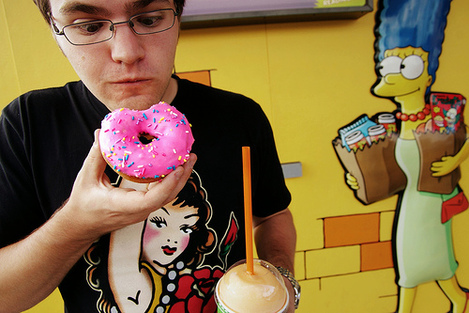|
Have you every felt the need to eat sweets, pastries, chips, or other calorie-dense foods after a night inadequate of sleep? Have you ever felt hungry after eating in the same situation? These are common effects of getting too little sleep. Ghrelin, Leptin, and Sleep The reason why we tend to gravitate to the pastries the day following a short night sleep is a hormonal response. The two hormones responsible for this are ghrelin and leptin. Ghrelin stimulates appetite while leptin produces a feeling of fullness.(1) When you get a shortened night of sleep, levels of ghrelin increase while levels leptin decrease.(1,2,3) Studies have shown that individuals with habitual sleep of 5 hours compared to those of 8 hours had 14.9% higher ghrelin levels and 15.5% lower leptin levels.(2) This creates a double dose of food cravings matched up with the feeling of being less satisfied after eating. What can be worse than having a strong craving for a donut, not feeling satisfied after eating it, and knowing that you had just blown your diet. Some health professionals simply explain that if your body can’t get the rest it needs, then it will trigger a need for quick energy, or food. A sleep-deprived individual will typically crave sugary or starchy foods that are very calorie-dense. Your body wants quick energy from these fast absorbing carbohydrates as well as something that will attempt to satisfy your seemingly insatiable stomach. Consistently get a full nights sleep to lose weight Studies show that there is a trend between lack of sleep and obesity.(2,3) The effect of ghrelin and leptin driving sleep-deprived individuals to eat starchy, high calorie foods can make people feel incapable of losing weight. The key to many individual’s weight loss success can lie in getting a full 8 hours of sleep every night. The difference in being well rested will allow you to make better choices in nutrition and enable you to have the energy for a great workout. So the next time you consider staying up late for unnecessary activities, (i.e.: watching tv, browsing the internet, interacting in social media, nights out with friends), think of how you will feel the next day. In addition to being tired, you are more likely to eat that quick pastry for breakfast, heavy comfort food for lunch, and skip your workout. Getting consistent, adequate rest takes discipline and planning just like working out and eating right. For expert personal training and fitness knowledge contact Jerry Yuhara, CPT,PES Photo by Chris Schmich References: 1. Cholette Bouchez (January 1, 2007) The Dream Diet: Losing Weight While You Sleep WebMD Retrieved from http://www.webmd.com/sleep-disorders/guide/lose-weight-while-sleeping?page=3 2. Taheri S, Lin L, Austin D, Young T, Mignot E (2004) Short Sleep Duration Is Associated with Reduced Leptin, Elevated Ghrelin, and Increased Body Mass Index. PLoS Med 1(3): e62. Retrieved from http://www.plosmedicine.org/article/info:doi/10.1371/journal.pmed.0010062 3. Patricia Prinz (December 7, 2004) Sleep Appetite and Obesity – What’s the link? PLoS Med Retrieved from http://www.ncbi.nlm.nih.gov/pmc/articles/PMC535424/ Located on 744 San Antonio Rd. Suite 2 Palo Alto, CA 94303 Breakthrough Personal Training: Expert Personal Trainer Serving Palo Alto, Los Altos, Mountain View, and Menlo Park. Weight-Loss, Optimal Results, Injury Prevention, Post-Rehablilitation, Nutrition, Downtown San Jose Bootcamp, and Fitness Services.
0 Comments
Leave a Reply. |
AuthorJerry Yuhara, CPT, CSCS, CMT #75123 Categories
All
JY Fitness
299 California Ave, Suite 120 Palo Alto, CA 94306 650-485-1240 contact@jyfit.com Contact Copyright JY Fitness 2024, All Rights Reserved. Find us on Nextdoor.com
|
